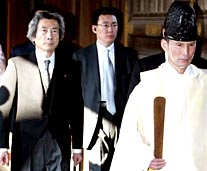 Japanese Prime Minister Junichiro Koizumi's latest visit to Tokyo's Yasukuni Shrine undermines the political foundation of China-Japan relations and runs counter to the Japanese government's commitment to face up to and review its history of aggression.
Japanese Prime Minister Junichiro Koizumi's latest visit to Tokyo's Yasukuni Shrine undermines the political foundation of China-Japan relations and runs counter to the Japanese government's commitment to face up to and review its history of aggression.
Chinese Vice Foreign Minister Yang Wenchang made this comment here Tuesday when he lodged serious representations to Japanese Ambassador to China Koreshige Anami about Koizumi's shrine visit.
This was Prime Minister Koizumi's third visit to the Yasukuni Shrine since he assumed office in April 2001. He visited the shrine on Aug. 13, 2001 and again on April 21, 2002, both times triggering protests from the governments and people of Asian countries.
Disregarding the repeated representations and strong opposition, Koizumi visited the Yasukuni Shrine again Tuesday. Yang said China expressed "strong dissatisfaction and indignation" over the wrong move made by Koizumi.
The Yasukuni Shrine is widely regarded as a symbol of Japanese militarism as it honors about 2.5 million Japanese war dead, including executed criminals such as wartime Prime Minister Hideki Tojo and other Class-A World War II criminals.
During World War II, Japanese militarism caused the deaths of millions of Chinese and Asian people and countless property losses, Yang said, adding that such an historical atrocity "will never be forgotten."
Yang said Koizumi's visit had "seriously hurt the feelings of the Chinese and Asian people, undermined the political foundation of China-Japan relations and run counter to the Japanese government's commitment to face up to and review its history of aggression."
Only by correctly viewing history could a repeat of the historic tragedy be avoided and peace and development in the Asia-Pacific region be guaranteed, Yang said.
China demanded Prime Minister Koizumi seriously listen to the just call of the Chinese government and people as well as the people of other Asian countries, take concrete actions to correct the wrongdoing, and eliminate the pernicious influence of the shrine visit, so as to bring China-Japan relations back to right track that is characterized by "taking history as a mirror and looking forward to the future," Yang said.
Also on Tuesday, Chinese Ambassador to Japan Wu Dawei in Tokyo was instructed to make a serious representation to Japanese Vice Foreign Minister Takeuchi Yukio against Prime Minister Koizumi's visit to the Yasukuni Shrine.
(Xinhua News Agency January 15, 2003)
|

